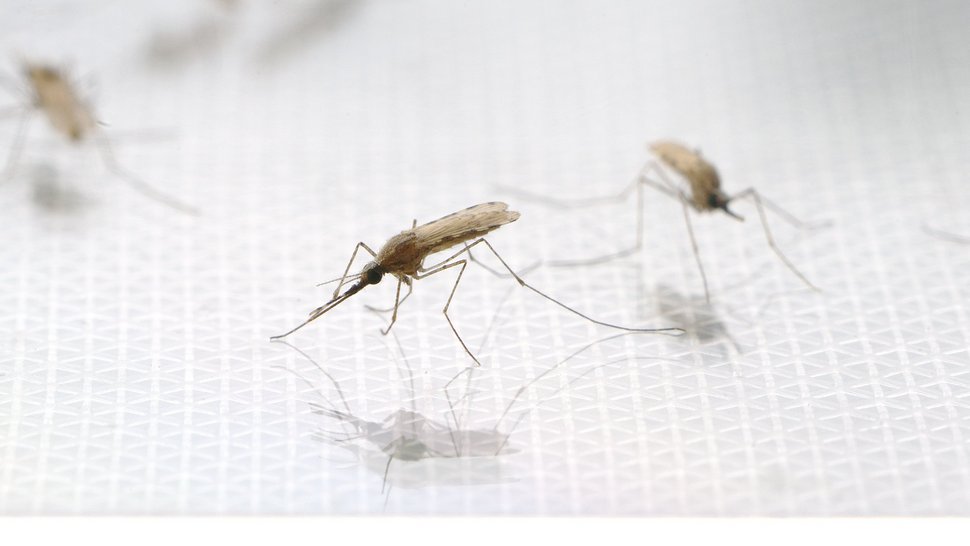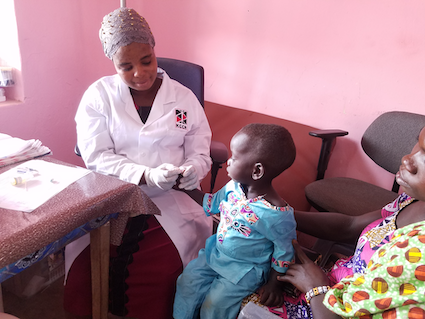Climate crisis, globalisation and urbanisation
Invasive malaria mosquito threatens African cities: BNITM calls for new focus
Hamburg on World Malaria Day, 25 April 2024 - Malaria occurs mainly in rural areas: The vector mosquito Anopheles prefers clean natural waters to lay its eggs. For some years now, however, Anopheles stephensi has been spreading in cities in sub-Saharan Africa. This Anopheles species is particularly adaptable, survives extremely high temperatures and drought and reproduces very well in building pits. "Malaria research and control must therefore also include cities in the future," says Prof Dr Jürgen May, Head of the BNITM. "Otherwise we will jeopardise our success in combating malaria."

Malaria remains one of the deadliest infectious diseases. The World Health Organisation (WHO) estimates that more than 600,000 people died worldwide in 2022 alone. Around 450,000 of these were children under the age of five. Countries south of the Sahara are the hardest hit.
They are now facing another challenge in the fight against malaria: In future, the infectious disease could affect not only rural but also urban regions. This is because an invasive species of the Anopheles vector mosquito is invading the rapidly growing cities: Anopheles stephensi has spread from South Asia to East Africa over the past decade. According to the WHO, the mosquito is now firmly established in Djibouti, Ethiopia, Sudan, Somalia and Kenya. It was also detected in West Africa: in Nigeria in 2020 and in Ghana in 2022.
Lower immunity in the cities
Anopheles stephensi is particularly adaptable. Its larvae can survive periods of extremely high temperatures and severe drought. If rain then sets in, they develop into adult mosquitoes without any problems. These can transmit two types of the malaria parasite: Plasmodium vivax and Plasmodium falciparum, the most dangerous malaria pathogen for humans. With Anopheles stephensi, these malaria parasites could therefore also penetrate the cities of sub-Saharan Africa - and encounter a rather immunologically naive population. This increases the risk of severe and fatal cases, especially in young children.

According to the WHO, Anopheles stephensi is resistant to many insecticides. In addition, unlike other Anopheles species, the mosquitoes are less likely to lay their eggs in natural water sources such as pools, puddles or swamps. They prefer water pits, which are often found on construction sites in the rapidly growing cities of sub-Saharan Africa. This is what researchers in Ethiopia have discovered.

BNITM: paradigm shift needed
"The invasion of the mosquito Anopheles stephensi requires a paradigm shift in the fight against malaria," says Infectious Disease Epidemiologist Jürgen May. "Control, research and research funding must now also include cities to a greater extent." All programmes must be expanded to include this perspective, both to combat mosquitoes and malaria itself.
Last year, the WHO launched an initiative to stop the spread of Anopheles stephensi. It contains guidelines for mosquito surveillance, containment and elimination and aims for close cooperation and information exchange between the various stakeholders. The WHO and UN-Habitat framework programme also serves as a guide for those responsible in the cities for malaria and mosquito control.
Prof. Dr Jürgen May, Chairman of the Board at the BNITM: "The advance of the invasive malaria mosquito Anopheles stephensi into sub-Saharan Africa can pose existential problems for people in urban regions," says May. They need our support more than ever.
International day of action remembers three billion people affected
In 2000, the WHO introduced World Malaria Day as an annual international day of action. It is a reminder that more than three billion people around the world are at risk of malaria. The WHO and other organisations strive to reduce the infectious disease. This involves a great deal of financial and logistical effort and has led to a steady decline in new cases in recent years.
BNITM expert service on the occasion of World Malaria Day 2024
On the occasion of World Malaria Day, the scientists listed are available for interviews with the press (please also send all enquiries to presse(at)bnitm.de):
Prof. Dr Jürgen May
Epidemiology, Malaria in Africa, Medikamentenentwicklung
Tel.: +49 (0)40 285380-369
E-Mail: may(at)bnitm.de
Dr Oumou Maïga-Ascofaré
Clinical studies, Drug resistance, Malaria in small children and pregnant women
Tel.: +233 32 206 0351
E-Mail: maiga(at)kccr.de;maiga(at)bnitm.de
Prof. Dr Michael Ramharter
Clinic of malaria, treatment, prophylaxis, therapy and vaccination studies
Tel.: +49 (0)40 285380-511
E-Mail: presse(at)bnitm.de
Dr Tobias Spielmann
Milestones in basic research, antibiotic resistance of malaria parasites
Tel.: +49 (0)40 285380-486
E-Mail: spielmann(at)bnitm.de
Dr Anna Bachmann
Host-Parasite-Interaction
Tel.: +49 (0)40 285380-439
E-Mail: bachmann@bnitm.de
PD Dr Thomas Jacobs
Immunology, vaccines
Tel.: +49 (0)40 285380-850
E-Mail: tjacobs@bnitm.de
We kindly ask you to mention the Bernhard Nocht Institute for Tropical Medicine as the source when citing it in texts and interviews and when using sound bites in TV and online reports.
Background information
World Malaria Report for download:
https://www.who.int/teams/global-malaria-programme/reports/world-malaria-report-2023
The WHO and UN-Habitat framework programme: “Global framework for the response to malaria in urban areas”:
for download: https://www.who.int/publications/i/item/9789240061781
The Bernhard Nocht Institute for Tropical Medicine (BNITM) in Hamburg dedicates a considerable part of its work to malaria research and works closely with the German Centre for Infection Research (DZIF) in this field. The spectrum ranges from molecular analyses of the malaria parasite to research into the spread and clinical course of the disease and vaccination and drug studies in Africa. For example, in order to test a malaria therapy with a next-generation triple combination, the BNITM is conducting a multi-centre clinical study in four African countries (Ghana, Mali, Gabon and Benin) together with the Kumasi Centre for Collaborative Research in Tropical Medicine (KCCR). The focus here is on the efficacy and safety of malaria treatment, which is particularly vital for children in sub-Saharan Africa.
Downloads
Contact person
Prof. Dr Jürgen May (Chair)
Board of Directors
Phone : +49 40 285380-261
Email : chair@bnitm.de
Dr Anna Hein
Public Relations
Phone : +49 40 285380-269
Email : presse@bnitm.de
Julia Rauner
Public Relations
Phone : +49 40 285380-264
Email : presse@bnitm.de
Further information






